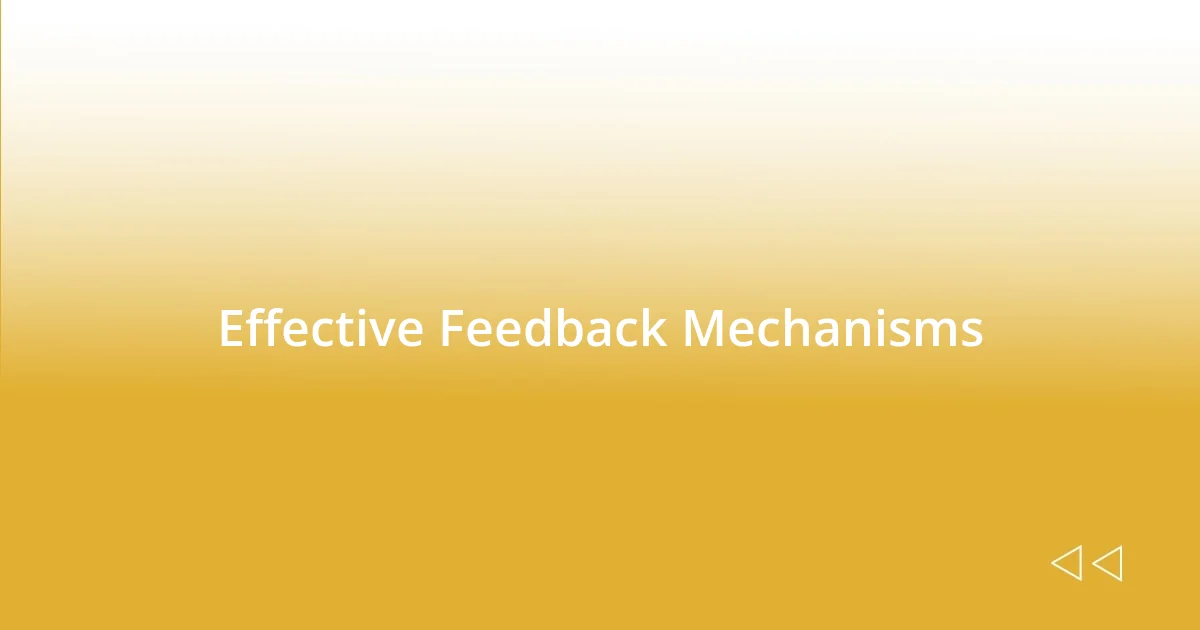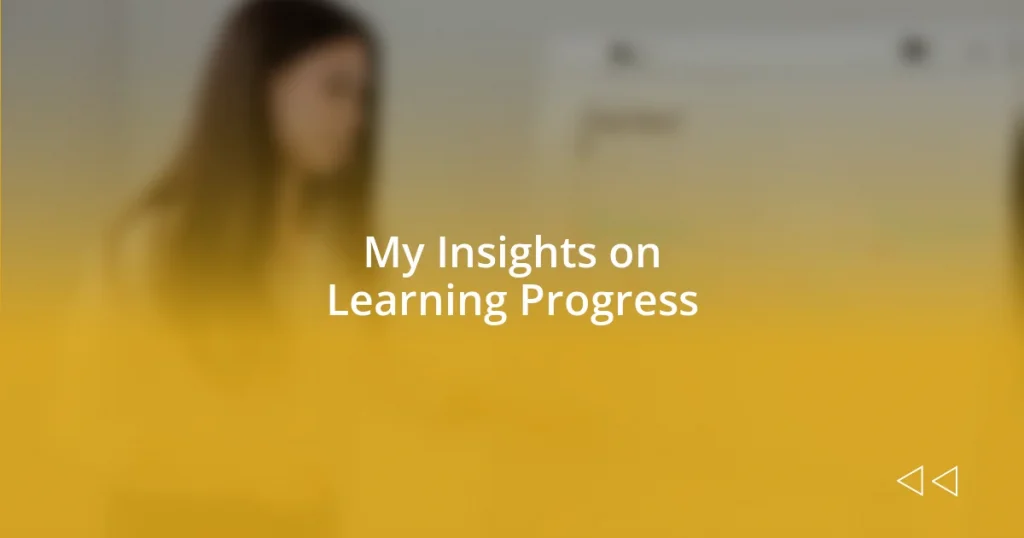Key takeaways:
- Learning progress is measured not only by grades but also by emotional growth, confidence, and persistence in facing challenges.
- Self-assessment empowers students to recognize their strengths and weaknesses, fostering ownership of their learning journeys and motivating progress.
- Setting achievable, personalized goals and tracking milestones enhances motivation and comprehension, enabling deeper engagement with learning materials.

Understanding Learning Progress
Understanding learning progress goes beyond mere grades or test scores; it’s about recognizing the journey of growth and development over time. I remember one student I worked with who was initially disheartened by a seemingly low score on a math test. However, when we looked at his previous scores, we realized he had improved significantly from the beginning of the semester. Isn’t it fascinating how sometimes, the numbers don’t always reflect the effort and understanding behind them?
I’ve often contemplated what truly defines learning progress. Reflecting on my experiences as a mentor, I’ve seen progress manifest in various forms—be it increased confidence in speaking up during class discussions or the ability to tackle complex problems independently. These shifts may not always shine through on paper, yet they signify deeper cognitive changes. Have you ever considered how much more there is to learning than just academic achievement?
Moreover, the emotional aspect of learning progress cannot be overlooked. When students recognize their own development, it sparks a motivation that can be incredibly powerful. I recall a moment with a young learner who, after months of consistent effort, finally grasped a challenging concept that had frustrated him for weeks. The joy on his face was not just about understanding; it was a celebration of his persistence and resilience. In what ways have you noticed small victories leading to significant shifts in mindset?

Importance of Self-Assessment
Self-assessment is a critical tool that empowers learners to take charge of their educational journeys. I’ve seen firsthand how students who actively evaluate their own understanding can identify not just what they’ve mastered but also where they need to focus their efforts. For instance, a friend of mine once shared how she started journaling her reflections after each study session. This simple practice helped her pinpoint specific areas she struggled with in her chemistry class, transforming her approach to studying. The ability to self-reflect truly turns knowledge into actionable insights.
Here are some key benefits of self-assessment:
- Enhanced Awareness: Encourages students to recognize their strengths and weaknesses, guiding their focus.
- Motivation Boost: Realizing progress can fuel intrinsic motivation, as learners see their growth over time.
- Ownership of Learning: By evaluating their understanding, students take personal responsibility for their educational outcomes.
- Improved Goal Setting: Self-assessed insights help set realistic goals, tailoring their study plans for better results.
- Critical Thinking Development: Encourages a habit of critical analysis, fostering deeper engagement with the material.
Engaging in self-assessment also promotes emotional resilience. I remember a case where a student initially felt overwhelmed by a failing grade. After a thorough reflection on his efforts, he recognized his hard work and the steps he had taken to improve. This realization not only eased his frustration but also inspired him to create a personalized action plan, showcasing the empowering effect that self-assessment can have on one’s academic journey.

Setting Achievable Learning Goals
Setting achievable learning goals is crucial for both motivation and success. I often encourage students to start with small, specific goals that build confidence over time. For instance, I remember working with a student who wanted to improve in reading comprehension. By setting a goal of reading just a few pages daily, we saw remarkable progress. It was inspiring to watch her gradually tackle more challenging texts as she developed her skills. Have you experienced something similar where small steps led to significant leaps in understanding?
When goal-setting, it’s essential to consider the SMART criteria: Specific, Measurable, Achievable, Relevant, and Time-bound. I learned this approach through trial and error. In one case, a student aimed to raise their math grade from a C to a B within a semester. By breaking this down into smaller goals, such as mastering one topic per week and seeking help when needed, we not only made the goal manageable but also instilled a sense of progress that was hard to ignore. Wasn’t it rewarding to see that motivation flourish as her skills improved?
Another powerful strategy involves making goals personal. I’ve found that goals resonate more when they connect to a student’s interests. For example, I once helped a young artist set a goal to complete one new drawing each week to enhance her visual thinking skills. This wasn’t just about art; it intertwined with her academic subjects as she illustrated scientific concepts through her drawings. Isn’t it amazing how aligning learning with our passions can propel us forward?
| Goal-Setting Method | Benefits |
|---|---|
| SMART Goals | Ensures clarity and a structured approach, making tracking progress easier. |
| Incremental Goals | Builds confidence as students achieve smaller milestones, fueling motivation. |
| Personalized Goals | Engages students deeply by connecting learning to their interests, enhancing retention. |

Tracking Learning Milestones
Tracking learning milestones plays a vital role in gauging progress and staying motivated. I remember when I first started using a simple chart to visualize my achievements in language learning. Every time I reached a new proficiency level, I’d mark it on the chart, and the satisfaction I felt was immense. It made the abstract idea of progress tangible, showing me how far I had come and where I still needed to go. Have you ever kept a record of your achievements? The act of tracking can turn your learning journey into a personal story of growth.
In my experience, setting up a consistent method for tracking milestones can foster a deeper connection to the learning material. I once had a student who struggled with math but found joy in incorporating weekly quizzes into his routine. Each quiz not only helped him see his improvement over time but also revealed patterns in his learning that he hadn’t noticed before. This insight was like finding a treasure map; it guided him toward the next areas to focus on. How engaging would it be to discover your own patterns and adjust your strategies accordingly?
Additionally, celebrating those milestones, no matter how small, can significantly enhance motivation. I’ve observed that when learners recognize and celebrate their achievements, it transforms what could feel like a tedious process into a rewarding experience. For example, when I completed a challenging course, I treated myself to a favorite meal. That act of recognition made all the hard work worthwhile and encouraged me to take on even bigger challenges. How do you celebrate your wins? Big or small, they all deserve acknowledgment as they fuel your desire to keep progressing.

Effective Feedback Mechanisms
Effective feedback mechanisms are foundational to a productive learning journey. I can’t emphasize enough the power of timely feedback; it’s like the sunlight that nurtures the growth of a plant. For instance, in my tutoring sessions, I often provide immediate feedback after practice exercises. When a student grasps a concept right there and then, I can see the spark of enthusiasm in their eyes. Isn’t it rewarding to witness those moments of clarity?
Creating a feedback loop is another crucial element. I remember working with a high school student who struggled with writing. After submitting her essays, we sat down together to review her work. I would highlight areas of strength and suggest specific improvements, encouraging her to revise. This cycle of feedback not only improved her writing skills but also fostered a sense of ownership over her learning. Have you ever experienced that profound satisfaction when you see your efforts lead to tangible improvement?
Moreover, I believe in the value of peer feedback, which often brings fresh perspectives. In group projects, I encourage students to share constructive critiques. Once, I facilitated a session where students exchanged drafts of their reports. The insights they offered each other often sparked dialogue and encouraged deeper understanding. This collaborative environment not only strengthened their work but also built a supportive community. Have you ever found that feedback from peers can open your eyes to new possibilities?

Adapting Learning Strategies
Adapting learning strategies is key to ensuring that you stay engaged and effective in your studies. I recall when I switched from traditional note-taking to mind mapping. That transition opened up a whole new realm for me; I could visually connect concepts that I’d previously seen as separate. Have you ever tried a different technique and been amazed by the results? The thrill of watching my understanding deepen was genuinely motivating.
Another adjustment I found valuable was varying my study environment. I used to study in the same spot every time, but moving my sessions to a local café sparked creativity and retention for me. The background chatter and aroma of coffee acted like a catalyst for my focus. Isn’t it interesting how a change of scenery can breathe new life into our learning process? I urge you to experiment with different locations and observe how it affects your productivity.
I’ve also discovered the importance of flexible learning paces. Early in my career, I assumed everyone learned at the same speed as I did, but that wasn’t the case. I had collaborators who excelled when I provided additional time to digest complex information. This taught me that sometimes, slowing down can lead to deeper comprehension. Have you ever noticed how giving yourself or someone else extra time can transform learning? It’s a gentle reminder to listen to our needs and adapt accordingly.

Reflecting on Learning Outcomes
Reflecting on learning outcomes is a powerful practice that can illuminate the paths we’ve taken throughout our educational journeys. I vividly remember a time when I took a hard look at my performance on a challenging project. Instead of just skimming over the results, I delved into what worked and what didn’t. This reflection helped me uncover patterns in my study habits that I hadn’t been aware of before. Have you ever paused to evaluate your learning outcomes? It can lead to some eye-opening revelations.
During one particular semester, I faced significant difficulties in a subject that was otherwise my strength. As I reflected on my grades, I realized I was rushing through the material instead of mastering it. I took a step back and dedicated time to revisit the foundational concepts. This shift not only improved my understanding but also reignited my passion for the subject. The journey of reflection often brings forth that much-needed clarity, doesn’t it?
Engaging with fellow learners also enriched my reflection process. A study group I was part of frequently discussed our individual results and insights. One evening, a peer’s reflective summary about her struggles with a topic mirrored my own. Hearing her perspective helped me reassess and relate my experiences with those of others. It’s fascinating how sharing can deepen our understanding of collective learning outcomes. Have you tapped into the power of conversation to enhance your reflections?















